
Reproductive Biology and Endocrinology
Scope & Guideline
Pioneering Insights in Reproductive and Endocrine Health
Introduction
Aims and Scopes
- Reproductive Physiology:
Research exploring the physiological mechanisms governing reproduction, including hormonal regulation, gametogenesis, and embryo development. - Endocrine Interactions:
Studies focusing on the interplay between endocrine systems and reproductive processes, including hormone signaling pathways and their effects on fertility. - Assisted Reproductive Technologies (ART):
Investigations into the efficacy and optimization of ART methods such as IVF, ICSI, and embryo transfer protocols. - Genetic and Epigenetic Factors:
Research examining the roles of genetic and epigenetic modifications in reproductive health, infertility, and developmental disorders. - Microbiome and Reproductive Health:
Studies assessing the impact of the microbiome on reproductive health, including its influence on fertility and pregnancy outcomes. - Innovative Diagnostic and Predictive Models:
Development of machine learning and AI-driven models to predict fertility outcomes and assess reproductive health based on clinical data. - Lifestyle and Environmental Impacts:
Research investigating how lifestyle factors, such as diet and environmental exposures, influence reproductive health and fertility outcomes.
Trending and Emerging
- Machine Learning and AI in Reproductive Health:
An increasing number of studies are utilizing machine learning and artificial intelligence to analyze large datasets for predicting fertility outcomes and optimizing ART protocols. - Microbiome Research:
There's a growing interest in understanding how the reproductive microbiome affects fertility and pregnancy outcomes, leading to a rise in studies focused on microbial communities and their interactions with reproductive health. - Personalized Medicine Approaches:
Research is increasingly focusing on personalized medicine in reproductive health, tailoring treatments based on individual genetic, epigenetic, and lifestyle factors. - Impact of Lifestyle and Environmental Factors:
More studies are exploring the effects of lifestyle choices and environmental exposures on reproductive health, emphasizing the need to address these factors in fertility treatments. - Emerging Therapies and Interventions:
There is a trend towards investigating new therapeutic interventions, including novel pharmacological agents and non-invasive techniques, to improve reproductive outcomes.
Declining or Waning
- Traditional Hormonal Therapies:
Research focusing solely on conventional hormonal therapies for reproductive disorders has seen a decline, as newer, more targeted approaches and personalized medicine strategies gain traction. - Animal Models in Reproductive Research:
While animal models remain important, there is a noticeable decrease in studies relying solely on these models, as researchers increasingly seek human-based studies and translational research. - Surgical Interventions:
The volume of studies centered on traditional surgical interventions for infertility has waned, likely due to the rising popularity of less invasive ART techniques and medical management options. - Generalized Fertility Assessments:
Research focusing on broad assessments of fertility without considering individual patient profiles or personalized approaches has decreased, with a shift towards more tailored, patient-specific investigations.
Similar Journals
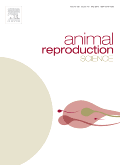
ANIMAL REPRODUCTION SCIENCE
Connecting Research and Practice in Animal ScienceANIMAL REPRODUCTION SCIENCE, published by Elsevier, is a leading journal dedicated to the field of animal reproduction and developmental biology. With an ISSN of 0378-4320 and an E-ISSN of 1873-2232, it serves as a vital resource for researchers, professionals, and students interested in advancing their understanding of reproductive mechanisms across various species. The journal has been recognized for its high-quality contributions, achieving a Q1 ranking in Animal Science and Zoology and showcasing its significant impact in the areas of Endocrinology and Veterinary Medicine as per the 2023 category quartiles. Covering a wide range of topics from reproductive physiology to genetic implications, this journal not only highlights innovative research but also fosters interdisciplinary dialogue in the rapidly evolving world of animal science. Though not currently offering open access, it remains a crucial platform for disseminating pivotal research findings from across the globe. With its rich history dating back to 1936, ANIMAL REPRODUCTION SCIENCE continues to drive excellence in animal reproduction studies, positioning itself at the forefront of the field, and solidifying its relevance in both science and industry.
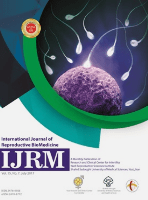
International Journal of Reproductive Biomedicine
Connecting professionals with cutting-edge findings in biomedicine.The International Journal of Reproductive Biomedicine, an esteemed publication by SHAHID SADOUGHI UNIVERSITY OF MEDICAL SCIENCES, serves as a pivotal platform in the fields of obstetrics and gynecology as well as reproductive medicine. Established in 2011 and transitioning to an open access model in 2015, this journal facilitates the dissemination of innovative research and critical findings to a global audience, particularly focusing on advancements in reproductive health and biomedicine. With an impact factor reflective of its commitment to high-quality scientific inquiry, the journal has achieved a notable ranking of Q3 in both its categories for 2023, contributing to its growing influence within the academic community. Researchers and professionals benefit from its broad scope, which encompasses a range of topics essential to reproductive health, thus fostering a rich exchange of knowledge. The journal's accessibility allows students and professionals alike to engage with the latest findings and contribute to ongoing discussions within this vital field of study.
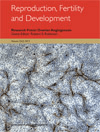
REPRODUCTION FERTILITY AND DEVELOPMENT
Exploring the frontiers of fertility and developmental research.Reproduction, Fertility and Development, published by CSIRO Publishing, is a prestigious journal that has been at the forefront of research in the fields of reproductive science, developmental biology, and related disciplines since its inception in 1989. With an ISSN of 1031-3613 and an E-ISSN of 1448-5990, this journal serves as a vital platform for disseminating innovative findings and methodologies that advance our understanding of reproductive processes and development in a variety of organisms. The journal is indexed in prominent databases, exhibiting a solid standing with a Q3 quartile ranking in both Animal Science and Zoology and Biotechnology, and covering 2023 rankings in multiple related categories. Operating from Australia, Reproduction, Fertility and Development embraces a commitment to enriching scholarly communication and fostering collaborative research efforts. Its focus on high-quality, peer-reviewed articles makes it an essential resource for researchers, professionals, and students seeking to stay abreast of the latest advancements and pivotal discussions in reproductive medicine and developmental biology.

JOURNAL OF MOLECULAR ENDOCRINOLOGY
Pioneering Insights into Hormonal RegulationJOURNAL OF MOLECULAR ENDOCRINOLOGY, published by BIOSCIENTIFICA LTD, is a prestigious academic journal that has made significant contributions to the fields of endocrinology and molecular biology since its inception in 1988. With an impressive impact factor that places it in the Q1 category for Endocrinology and Q2 for Molecular Biology, this journal is recognized for its rigorous peer-reviewed research that addresses key questions at the intersection of molecular mechanisms and hormonal regulation. The journal's accessibility within the Scopus rankings, notably positioned 45th out of 128 in Endocrinology, highlights its relevance and influence in shaping contemporary scientific discourse. Although the journal does not currently offer open access options, it remains an essential resource for researchers, professionals, and students eager to explore groundbreaking discoveries and advancements in the hormonal sciences. The JOURNAL OF MOLECULAR ENDOCRINOLOGY continues to pave the way for critical exploration and innovation, ensuring its place as a vital publication for the advancement of knowledge in molecular endocrinology.
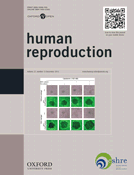
HUMAN REPRODUCTION
Shaping the future of reproductive health through rigorous scholarship.HUMAN REPRODUCTION is a prestigious academic journal published by Oxford University Press, dedicated to advancing the field of reproductive medicine. With an impressive impact factor highlighting its significance, the journal ranks in the top quartile (Q1) for Obstetrics and Gynecology, Rehabilitation, and Reproductive Medicine, showcasing its crucial role in disseminating high-quality research. Founded in 1986, it has become a key resource for researchers, practitioners, and students interested in cutting-edge developments and innovative practices in human reproduction. Despite not currently offering open access, the journal continues to publish a wealth of peer-reviewed articles that contribute substantially to clinical knowledge and practice. With Scopus rankings placing it among the top journals in its categories, HUMAN REPRODUCTION remains an essential platform for discussion and dissemination of vital findings impacting reproductive health globally.
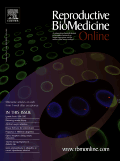
REPRODUCTIVE BIOMEDICINE ONLINE
Advancing reproductive science through rigorous research.Reproductive Biomedicine Online, published by Elsevier, is a leading peer-reviewed journal that has established itself as a pivotal resource in the fields of Developmental Biology, Obstetrics and Gynecology, and Reproductive Medicine. With an impressive Impact Factor and a Q1 ranking in its respective disciplines as of 2023, this journal provides a platform for innovative research and comprehensive reviews that contribute to advancements in reproductive healthcare. The journal boasts rigorous Scopus rankings, placing it within the top tiers of its categories, which underscores its significance in shaping contemporary biomedical inquiry. Although not open access, it remains widely accessible through institutional subscriptions, making its wealth of knowledge available to researchers, clinicians, and students alike. Since its inception in 2000, Reproductive Biomedicine Online has been committed to fostering a deeper understanding of reproductive processes and biomedicine, ensuring that its content remains relevant and impactful in addressing challenges in reproductive health, thereby championing exceptional scientific discourse.
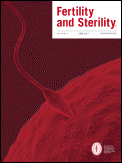
FERTILITY AND STERILITY
Empowering research in fertility and gynecology.Fertility and Sterility is a prestigious peer-reviewed journal dedicated to the fields of obstetrics, gynecology, and reproductive medicine. Published by Elsevier Science Inc, this journal has been a cornerstone of scientific discourse since its inception in 1950 and is set to continue its influential coverage of cutting-edge research until 2024. Boasting an impressive impact factor, Fertility and Sterility is ranked among the top-tier journals in its category, holding Q1 status in both Obstetrics and Gynecology and Reproductive Medicine. With Scopus rankings placing it in the 97th and 96th percentiles respectively, the publication serves as a vital resource for researchers, clinicians, and students who seek to advance their understanding of fertility issues and reproductive health. Although it does not currently offer open access options, the journal remains committed to disseminating high-quality research and innovative solutions to the complex challenges in reproduction, empowering professionals and scholars to make meaningful contributions in their fields.
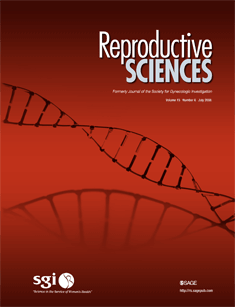
Reproductive Sciences
Innovative Insights for Obstetrics and GynecologyReproductive Sciences is a premier journal published by SPRINGER HEIDELBERG, dedicated to the field of obstetrics and gynecology. With its ISSN 1933-7191 and E-ISSN 1933-7205, the journal has established itself as a leading source of high-quality research and clinical insights since its inception in 2007, and continues to converge its scope into 2024. Currently ranked in the Q1 category for obstetrics and gynecology, it holds the 43rd position among 209 journals in the Scopus rankings, underscoring its influence and relevance within the medical community. This journal is particularly dedicated to advancing knowledge in reproductive health, providing a platform for innovative research and clinical practices through both traditional and open access options. Located in Switzerland with an address in Heidelberg, Germany, Reproductive Sciences is not just a publication; it is a vital resource for researchers, professionals, and students seeking to make impactful contributions to the field of reproductive health.
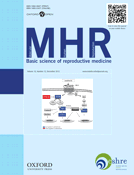
MOLECULAR HUMAN REPRODUCTION
Exploring the Molecular Frontiers of Human ReproductionMOLECULAR HUMAN REPRODUCTION, published by Oxford University Press, is a pivotal journal dedicated to advancing the field of reproductive biology. Since its inception in 1995, the journal has been recognized for its rigorous peer-reviewed research and substantial contributions to the understanding of molecular mechanisms underlying human reproduction. With an impressive impact factor and ranked within the top tiers (Q1 and Q2) across diverse categories including Embryology, Obstetrics and Gynecology, and Reproductive Medicine, it stands as an essential resource for researchers, healthcare professionals, and students alike. The journal aims to publish cutting-edge research that explores the complexities of human reproduction at the molecular and cellular levels, fostering a deeper understanding that can be translated into clinical practice. Although it currently operates under a subscription model, the valuable insights and groundbreaking findings featured within its pages continue to influence the trajectory of reproductive health research globally. Located in the heart of Oxford, United Kingdom, the journal remains committed to addressing vital challenges in the field and promoting innovative scientific dialogue.

Jornal Brasileiro de Reproducao Assistida
Advancing reproductive science for a healthier tomorrow.Jornal Brasileiro de Reprodução Assistida is a prominent academic journal focusing on the latest advancements in reproductive medicine, published by the Sociedade Brasileira de Reprodução Assistida (SBRA). With an ISSN of 1517-5693 and an E-ISSN of 1518-0557, this journal has established itself as a vital resource for researchers, healthcare professionals, and students in the fields of obstetrics and gynecology. Notably recognized within the Q2 category for Obstetrics and Gynecology, it ranks #91 out of 209 in Scopus, placing it in the 56th percentile among its peers. The journal serves as a platform for disseminating innovative research and clinical practices related to assisted reproduction, fostering collaboration and knowledge sharing among professionals in Brazil and beyond. Although currently not an open-access journal, it remains committed to enhancing the scientific discourse in reproductive health, reflecting its vision of supporting advances in healthcare through rigorous peer-reviewed studies. Explore the pivotal contributions made in this field from 2000 to the present, and stay abreast of transformative developments that are shaping reproductive science.